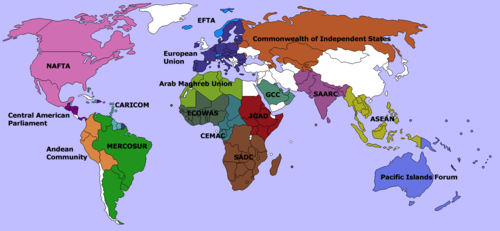
The following is a list of the major existing intergovernmental organizations (IGOs).
Contents
- United Nations and agencies
- Agricultural research organizations
- Fisheries organizations
- Maritime organizations
- Financial, trade, and customs organizations
- Regional organizations
- Europe
- Asia
- Transcontinental
- Africa
- Americas
- Military alliances
- Cultural, ethnic, linguistic, and religious organizations
- Educational organizations and universities
- Law enforcement cooperation
- Transport
- Humanitarian organizations
- Environmental organizations
- Arms control
- Energy organizations
- Multi sector organizations
- Nuclear power organizations
- Sustainable energy organizations
- Digital organizations
- Ideological and political groupings
- Other
- Defunct
- See also
- References
For a more complete listing, see the Yearbook of International Organizations , [1] which includes 25,000 international non-governmental organizations (INGOs), excluding for-profit enterprises, about 5,000 IGOs, and lists dormant and dead organizations as well as those in operation (figures as of the 400th edition, 2012/13). A 2020 academic dataset on international organizations included 561 intergovernmental organizations between 1815 and 2015; more than one-third of those IGOs ended up defunct. [2]


